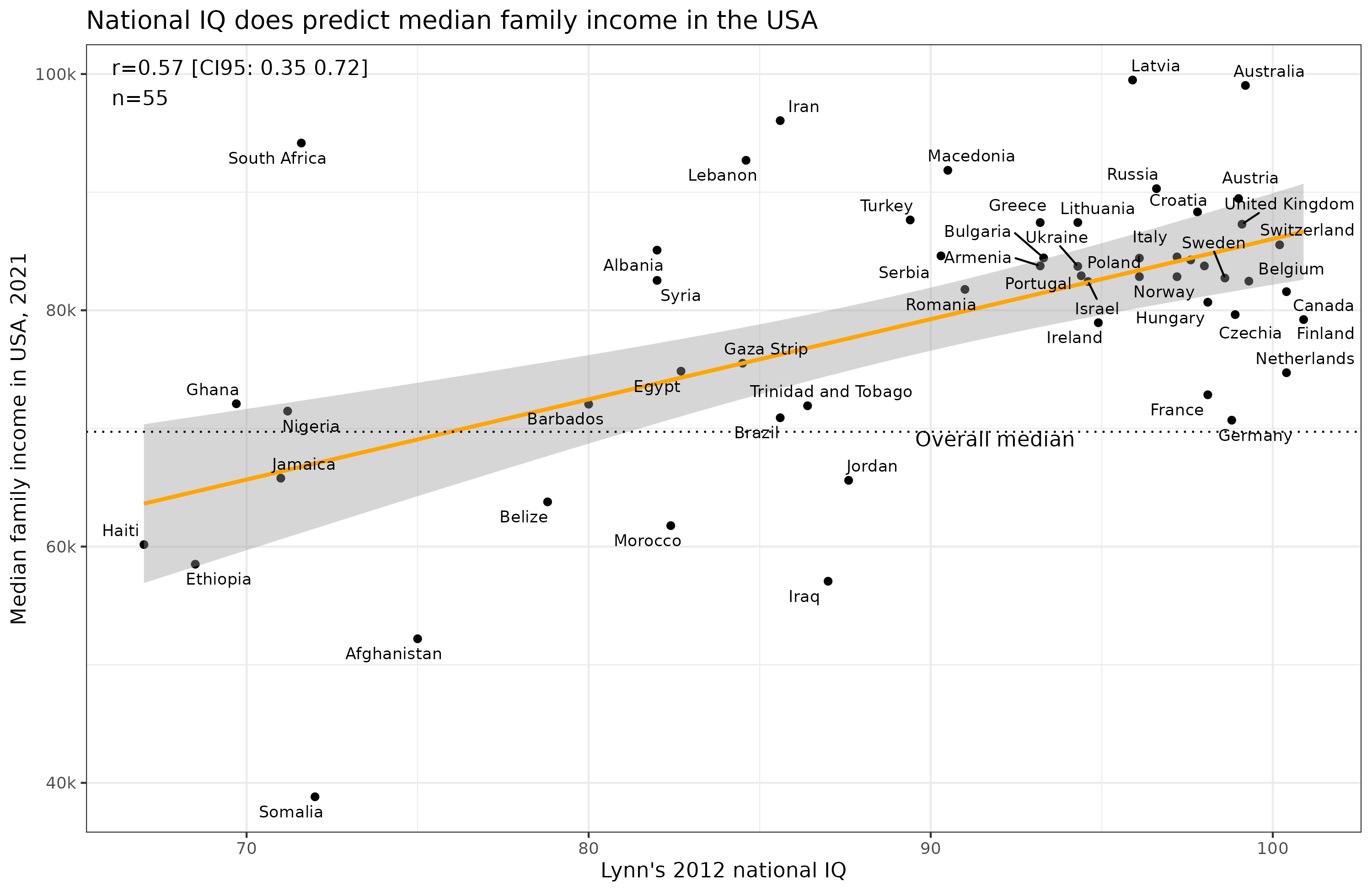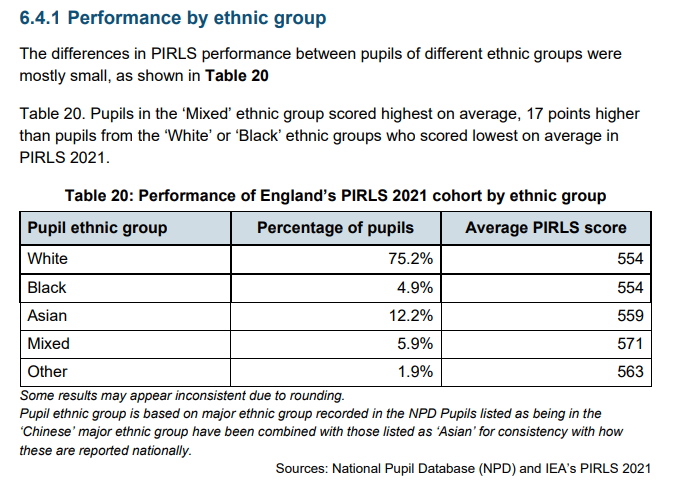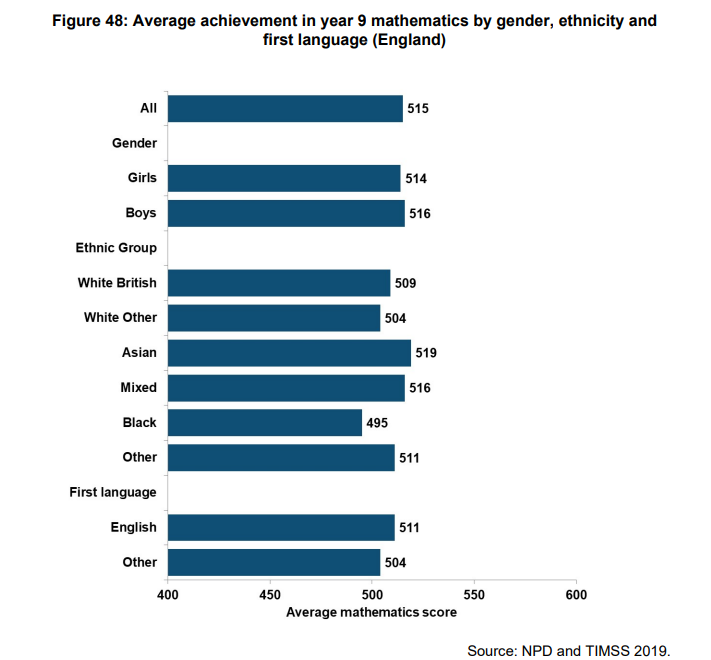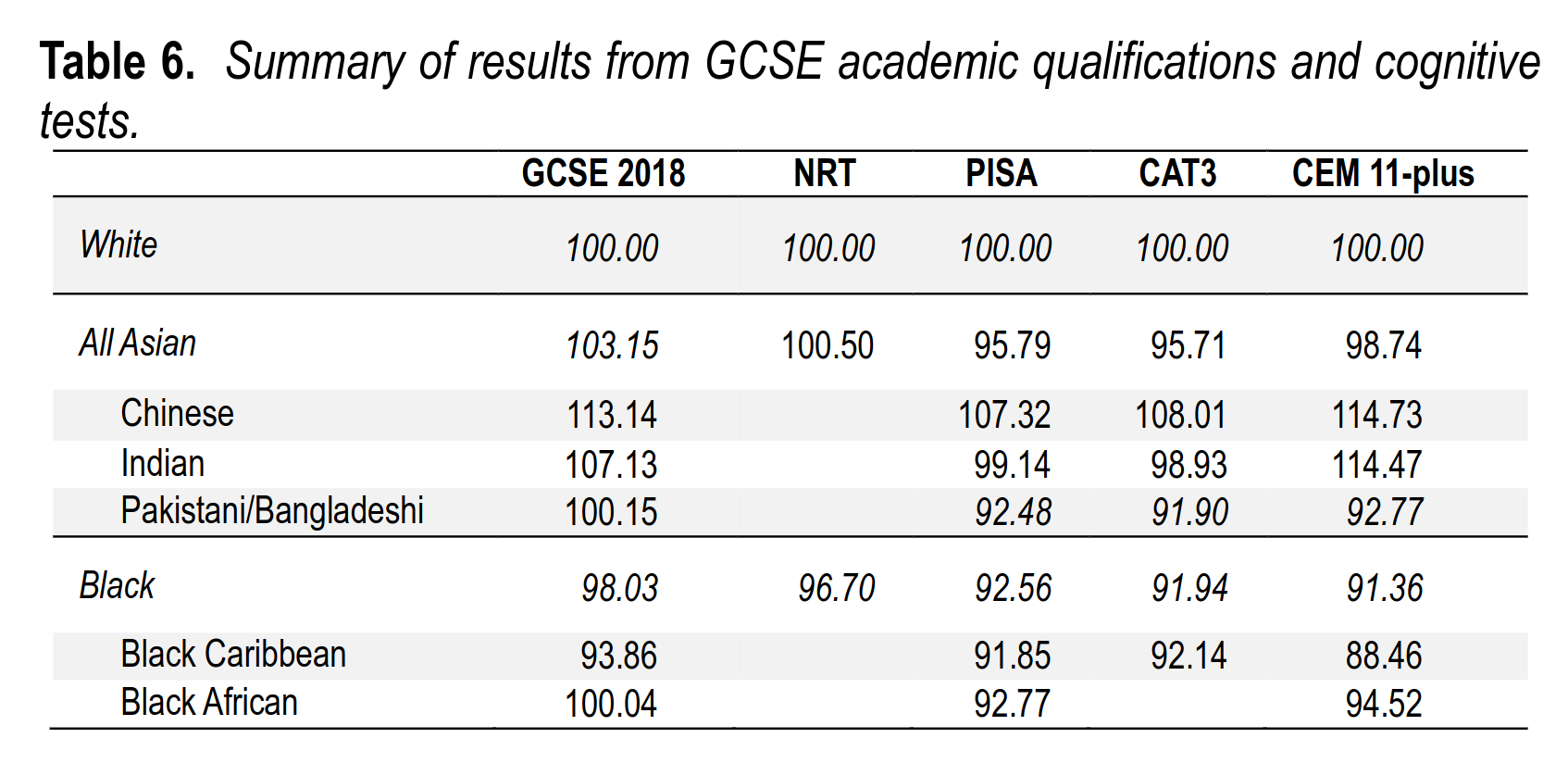
David Friedman, a self-described “anarchist-anachronist-economist” and author of The Machinery of Freedom: Guide to a Radical Capitalism (on my to-read list) has written a criticism of the hereditarian position on his Substack (Race, Gender and IQ). It raises several points of debate that I will cover.
First, he covers the debate culture, namely what happens if you question the dogma. As a radical capitalist in a broadly socialistic world, he will have some familiarity with this. He writes:
In modern-day America, anyone arguing that the difference in average IQ between blacks and whites is part of the reason for the difference in average outcomes risks accusation of racism. Anyone arguing that the difference in the distribution of IQ between men and women is part of the reason that there are more men than women with elite positions in fields such as mathematics risks being accused of sexism. Examples of the risk of publicly offering such ideas are provided by the cases of James Watson and Lawrence Summers. Watson, who received a Nobel prize for his role in the discovery of the nature of DNA, arguably the most important biological breakthrough of the century, was so careless as to tell the Times that he was “inherently gloomy about the prospect of Africa” because “all our social policies are based on the fact that their intelligence is the same as ours – whereas all the testing says not really”. He was attacked ferociously for the statement, accused of prejudice, stripped of titles and positions.
Prejudice is belief held without evidence. Watson’s view may have been mistaken but there was evidence to support it, since the average measured IQ in African countries was indeed strikingly below that in European countries. His attackers, so far as I could tell, had no evidence in support of their view, were acting on pure prejudice.
With that said, he raises several lines of evidence against hereditarianism. Hereditarianism we may here define as in global racial hereditarianism which is the position that there is a large genetic component to the observed racial gaps in intelligence as measured by a variety of standardized tests (Wechsler, Raven’s, PISA etc.). The lines are:
- Thomas Sowell’s argument based on the performance of West Indian (African) immigrants in the USA
- Chanda Chisala’s argument based on the performance of African immigrants, chiefly Nigerians, in the UK
- Chisala’s argument based on the performance of Nigerians in Nigeria on Scrabble and Checkers.
- A proposed explanation for US Africans’ lower intelligence based on vitamin D deficiency
Let’s go over them in turn
West Indian immigrants in the USA
The result of suppressing arguments for an unpopular view is that nobody knows what conclusion would come out of an open debate, although many may find it prudent to pretend to. Until very recently, the only convincing argument I had seen against the claim of lower African genetic IQ was Thomas Sowell’s observation1 that the average family income of immigrants to the U.S. from the West Indies reached the U.S. average in one generation. West Indians are blacker than Afro-Americans in both their genes and their skin color, so if Afro-Americans did badly because of their African genes West Indian immigrants should do worse, and similarly if the reason was discrimination. Sowell offered instead an explanation based on the different cultures produced by differences between West Indian and North American slavery.2

So the West Indies is the same as the Caribbeans, just an older term originating in European explorers’ incorrect idea that they had found India, whereas they had really found the Americas. So do Caribbeans do particularly well in the USA? The census provides us with family median income by ancestry, which looks like this:

Have you found a pattern yet? It’s difficult to find one by eye. We can check the hereditarian prediction, namely that the median family income should be quite strongly correlated with the national IQ of these populations. Here’s the regression:

So the regression line doesn’t show a correlation of 1.00, which is what one would expect under very strong assumptions (no selection, everybody is assimilated, same age distribution, no favoritism etc.). But it does show a correlation of .57. I think hereditarians can be reasonably happy with this result. There are some obvious outliers. Why is Latvia so high? Latvia is not a bad country, but it is not a great one either. Iranians do a lot better than expected too, what gives? Unfortunately for Sowell, Caribbeans (West Indies in the table) do not do very well. Their median is about 64k, below the average of 70k. So they do better than expected on the national IQs, but they aren’t impressive. Most African countries do poorly, except for South Africa. You can easily guess why that’s the case: South Africans in the USA are mainly Europeans escaping the failing country. Indeed, Elon Musk the richest man in the world, is an American South African. The deviations from expectation mainly show selection bias, i.e., the quality of the stock that each country sends is not the same as the country average. Furthermore, there is bias concerning the European ancestries, as e.g. German ancestry is unpopular to declare, and there are several nonsensical ones like “American”. A better test would be to ascertain ancestry using genetics and see if this clears up some patterns. One can measure immigration selection by comparing origin country polygenic scores to the ones in the USA. This hasn’t been done as far as I know.
Nigerians in Angloland
I have written about the problem with Chisala’s Nigerian argument before. It is mainly the same as the above: Nigerians in the UK are rather elite. They also appear to be somewhat elite in the USA, but less impressively so. Back in 2015, John Fuerst compiled IQ data for Nigerian children in the USA, and one can see them being above other Africans, though not impressively so. See his post Using Surnames to Assess Ethnic Aptitude. In short, recent African immigrants in the USA are about 0.35 d below Whites, and Nigerians did slightly better than Whites -0.15 d.
What about the UK? Here the evidence is curiously inconsistent. Chisala relies mainly on children’s data, which show results like this (PIRLS 2023):

Mysteriously, the gaps have disappeared! Or have they? Here’s another recent one:

Recently, I studied Africans in the UK who work as survey takers. I found:
This brief report analyzes data from a series of studies carried out by Bates and Gignac (2022), collected from paid survey takers on the Prolific platform (total n = 3357). In this UK sample, Black-White gap sizes on cognitive tests were substantial with an overall effect size d of 0.99 standard deviations adjusted for unreliability (unadjusted means = 0.84 d). Testing for measurement invariance via differential item functioning found either no bias or bias of trivial magnitude. We conclude that the Black-White intelligence gap seen in Prolific workers is of similar magnitude to the gap seen elsewhere in America.
Here’s a meta-analysis of adolescent IQ gaps in the UK: Recent Studies of Ethnic Differences in the Cognitive Ability of Adolescents in the United Kingdom (2021):
Research from the 20th century showed that ethnic minorities under-performed White British on measures of cognitive ability in the United Kingdom. However, academic qualification results from the first two decades of the 21st century suggest minimal to reverse ethnic differences. To better understand the pattern of contemporary cognitive differences among adolescents in the 21st century, we analyzed academic achievements at age 16 in the GCSE and cognitive ability in four cognitive tests: the National Reference Test, NRT; the Programme for International Student Assessment, PISA; Cognitive Ability Test 3 (CAT3); and Center for Evaluation and Monitoring (CEM) 11-plus. Results from the PISA, CAT3 and CEM 11-plus tests correlate strongly across ethnic groups. These results show that Bangladeshi, Pakistani and Black students score approximately one half of a standard deviation below Indian and White students, while Chinese students perform significantly above the latter groups. In contrast, but consistent with academic qualifications, results based on the NRT suggest smaller ethnic gaps.

So, what gives? Generally speaking, datasets with adult data that aren’t made by the government or NGOs show large gaps. The others show medium, small or no gaps. Maybe the government is cooking the books in the same way they suppressed information about grooming gangs. There is a meta-analysis of the adult gaps in the works, but it’s still stuck in publication nightmare. The Black-White gap in these data was about 1 d adjusted for reliability (12 IQ before).
Generally, it is unwise to rely on unrepresentative countries in an argument about racial differences and genetics. Angloland has unusual and usually strict immigration patterns compared to other Western countries, so we can expect their data to be more distorted insofar as genetics is concerned.
Scrabble as an IQ test
Chisala’s second line of argument is that African performance in checkers and Scrabble competition would be impossible if African average IQ were anything like as low as the estimates. While success in Scrabble at low levels depends in large part on vocabulary, the critical skill in high level competition is the ability to do the mental arithmetic needed to decide which play will give the player the most points and his opponent the fewest. Top white players have very high IQ’s; many are mathematicians. Yet a substantial fraction of the top players of English language Scrabble, including at least one world champion, are from Nigeria.
Friedman is probably unfamiliar with my take-down of this line of argument. It is in the study Is National Mental Sport Ability a Sign of Intelligence? An Analysis of the Top Players of 12 Mental Sports (2019):
Research at the individual level shows strong positive relationships between performance in video games and on intelligence tests. Together with evidence of above average IQs of players of traditional mental sports such as chess, this suggests that national IQs should be strongly related to national performance on mental sports. To investigate this, lists of top players for 12 different electronic sports (e-sports) and traditional mental sports were collected from a variety of sources (total n = 36k). Using a log count approach to control for population size, national cognitive ability/IQ was found to be a predictor (p<.05) of the relative representation of countries among the top players for every game except Go. When an overall mental sports score was calculated using a factor analytic approach, the factor scores correlated r = .79 with Lynn and Vanhanen’s (2012) published national IQs. The pattern was somewhat nonlinear such that national IQs below 85 seemed to have no relationship. The games that related most strongly with the general factor of mental sport ability also correlated more strongly with national IQs (r = .94). The relationship was fairly robust to controls for geographical region (coefficient 74% of the original in chosen model specification).
I note in the discussion:
With regards to the arguments by Chisala concerning Nigeria and Scrabble, we find no support for mismeasured Nigerian intelligence. It is true, as he noted, that Nigerians are much better at Scrabble than one would expect (standardized residual for Scrabble is 1.55, rank 3). However, Nigerians underperform on the remaining 11 sports (all residuals are negative), and the overall factor score of Nigeria (-1.39) is about what one would expect based on the current estimates of the country’s mean cognitive ability and the relation to national IQ. Indeed, based on a linear regression with just IQ, the standardized residual for Nigeria is only – 0.16, meaning that the country performs very slightly worse at mental sports in general than one would expect based on its mean national intelligence. The predicted IQ of Nigeria was 73.1 based on a nonlinear model with just game performance as the predictor, Lynn and Vanhanen’s (2012) estimate was 71.2, and a recent large-scale study (n ≈ 11k) using Raven’s Standard Progressive Matrices found a mean IQ of 65.5 (Hur, Nijenhuis & Jeong, 2017).11 The anomalously high Scrabble performance is not plausibly interpreted as hidden ability, but rather as a culture-specific preference for a specific sport.
For those interested in the quality of Nigerian IQ data from Nigeria, see this recent post.
Vitamin D deficiency
It is true that Africans living in sun poor regions have relatively low levels of vitamin D. However, it is not so clear this is a big problem. Take this new study of Africans in the USA using the NHANES dataset. They studied several medical outcomes, finding that vitamin D levels doesn’t seem to work the same way in Europeans and Africans (“The vitamin D paradox in Black Americans”). The study that Friedman cites for the importance of vitamin D for children’s intelligence is not that convincing. Here’s their results:
Mean ± SD 25(OH)D concentration among 1019 eligible dyads was 21.6 ± 8.4 ng/mL, measured at a mean ± SD gestational age of 23.0 ± 3.0 wk. Vitamin D deficiency [25(OH)D < 20 ng/mL] was observed in 45.6%. Maternal 25(OH)D differed by race with a mean ± SD of 19.8 ± 7.2 ng/mL in Blacks sand 25.9 ± 9.3 ng/mL in Whites ( P < 0.001). In adjusted models a 10-ng/mL increase in 25(OH)D was associated with a 1.17-point higher Full Scale IQ (95% CI: 0.27, 2.06 points), a 1.17-point higher Verbal IQ (95% CI: 0.19, 2.15 points), and a 1.03-point higher Nonverbal IQ (95% CI: 0.10, 1.95 points). We observed no evidence of effect modification by race.
So the races differ by about 6 ng, and the effect size they estimated was 1.17 IQ/10 ng, this comes out to an explanation of 0.71 IQ. But you can also see that their confidence intervals are very close to 0, so these results are likely inflated by p-hacking. Of course, such a study like this cannot tell us that much about causality to begin with, but even if we assume it’s 100% causal instead of being somewhat genetically confounded (everything is), it would explain some 0.71/15 IQ or 5% of the gap. Clearly, not an important contribution based on this research.
Conclusion
David Friedman’s 4 lines of evidence do not offer anything that should move the estimate much with regards to genetic causation of racial gaps in intelligence. Readers who would like to read about more evidence for the hereditarian position can find it in these posts and papers:
- Fuerst, 2012, The facts that need to be explained
- Lasker et al, 2019, Global Ancestry and Cognitive Ability
- Winegard et al, 2020, Dodging Darwin: Race, evolution, and the hereditarian hypothesis
- Warne, 2021, Between-Group Mean Differences in Intelligence in the United States Are >0% Genetically Caused: Five Converging Lines of Evidence
- Piffer, 2021, Divergent selection on height and cognitive ability: evidence from Fst and polygenic scores
- Fuerst et al, 2022 (preprint), A Genetic Hypothesis for American Race/Ethnic Differences in Mean g: A Reply to Warne (2021) with Fifteen New Empirical Tests Using the ABCD Dataset

